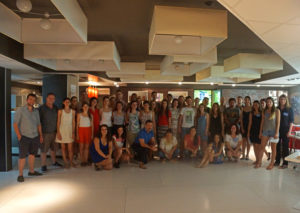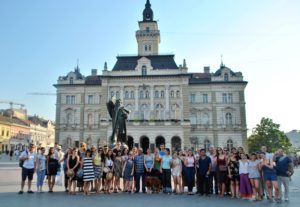About the first edition of the Summer School – activities and results
International Summer School of Latin American Studies, under the slogan Latin America and Challenges of the Modern World, was realized from July 20 to 24, 2017 in Belgrade and Novi Sad.
The following data confirms the significance and results of the first edition:
- Number of participants: 23 (12 from Serbia and 11 from abroad – Montenegro, Bosnia and Herzegovina, Croatia, Slovenia, Poland, Spain, Argentina, Brazil, Russia, Turkey)
- Number of lecturers: 12 academics and experts from different areas related to Latin America, coming from Serbia, as well as from Bosnia and Herzegovina, Poland, Spain, Mexico, Argentina and Australia.
- The publication of the Collection of papers as one of the International Summer School of Latin American Studies First Edition results is scheduled for spring 2018. This bilingual Collection (Spanish and Serbian) has 8 papers, 1 interview, 3 reviews of the commission and 1 translation.
- Institutions that supported the project: Faculty of Philology, University of Belgrade; Faculty of Philosophy, University of Novi Sad; Institute of European Studies, Institute for Philosophy and Social Theory, Institute Cervantes in Belgrade, Professor Andrzej Dembicz Foundation (Warsaw), KC Grad, AlernAktiva, YULATAM.
- Media coverage of the School: 3 television shows (Summer School goals presentation and interviews), 5 radio shows (project goals and lecturers presentation, reportages), 6 publications in newspapers and magazines (majority interviews).
- General impression of the participants in the School on the basis of evaluations:
Average grade for the first edition of the Summer School: 4,04 / 5
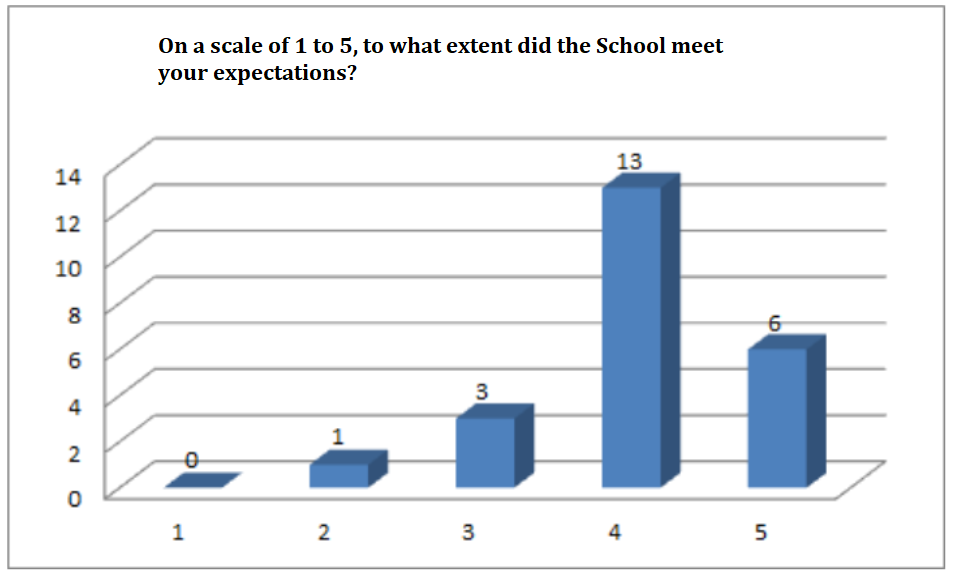
During the five-day duration of the School, numerous activities were held:
LECTURES:
- Latin America and the Challenges of the Modern World – Dejan Mihailović (Monterrey Institute of Technology and Higher Education, Mexico)
- Multidimensional Latin America: where to? – Kataryina Dembicz (CESLA, Poland)
- The Role of the Casa de las Américas in the Development of the Latin American Boom – Ángel Esteban del Campo (University of Granada, Spain)
- Literary Translation as Work, Art and Cultural Agent. Problems of Linguistic Differences in Different Spanish-Speaking Areas and the Publishing Market – Dubravka Sužnjević (Translator, Mexico)
- The Drug Literature Boom and Smuggling by Víctor Rascón Bando as Masterpiece – Diana Palaversić (University of New South Wales, Australia)
- Legal Status and Rights of Human Beings Crossing State Borders according to International and Domestic laws v. Western & Islamic Emotional, Socio-Cultural and Ideological Imaginings and Constructs – Višeslav Simić (Monterrey Institute of Technology and Higher Education, Mexico)
- Current State of Philosophy and Latin American Thought against New Challenges – Horacio Cerutti-Guldberg(National Autonomous University of Mexico, Mexico)
- The Right to Information in the Latin American Means of Communication and the American Convention about Human Rights – Esther Susana Borgarello (National University of Córdoba, Argentina)
- Human Rights and International Law; Latin American Perspective – Carlos Juárez Centeno (National University of Córdoba, Argentina)
- Latin American Studies Today: between the Identity, the History of the Ideas and the Decoloniality – Óscar Barbosa Lizano (Professor Andrzej Dembicz Foundation, University of Warsaw, Poland)
WORKSHOPS AND NON-FORMAL TALKS:
- Contemporary Narrative of Latin America – Bojana Kovaćević Petrović (University of Novi Sad, Sebia)
- What does Latin America Tell Us? Talk about Social Movements, Politics and Psychoanalysis – Igor Štiks (writer and activist, Bosnia and Herzegovina)
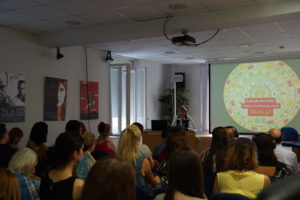
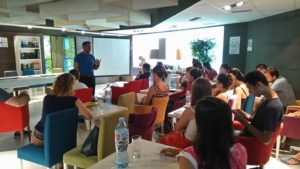
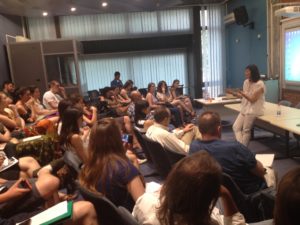
PROFESSIONAL SEMINAR:
- Steps to the transcapitalist life, dedicated to the School’s guest of honour Horacio Cherutti-Guldberg (National Autonomous University of Mexico, Mexico)
CULTURAL EVENTS:
- Promotion of the First Translation to Serbian of the Book Discovery and Identity of Latin America by the Mexican Author Leopoldo Zea
Participants: Horacio Cerutti-Guldberg (Mexico) – philosopher; Anđela Gašić (Serbia) – translation team coordinator
Moderator: Jelena Spasojević – project coordinator
- Presentation and Talk about the Film Cycle and Book by Carlos Fuentes The Buried Mirror
Participants: Ángel Esteban del Campo (Spain); Dubravka Sužnjevič (Mexico); Dejan Mihailović (Mexico)
Moderator: Bojana Kovaćević Petrović (Serbia)
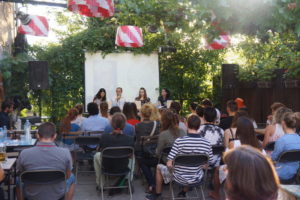
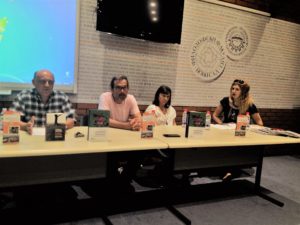
TRIBUNE:
- Comparative Analysis of Europe and Latin America
Participants: Dejan Mihailovic (Mexico); Dalibor Soldatić (University of Belgrade, Serbia); Miša Đurkovic (Instiute of European Studies, Serbia); Carlos Juárez Centeno (Argentina)
Moderator: Đurđa Trajković – Institute for Philosophy and Social Theory (Serbia)
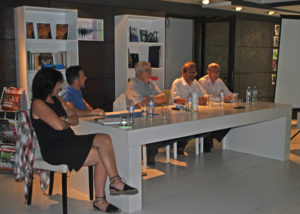
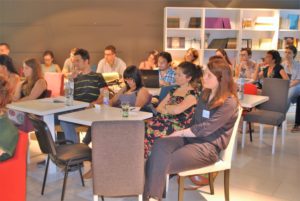
The tribune, as the last activity of the School, was also an introduction into the issue of the second edition.
How has the Project started?
At the time of a complete stagnation in the development of political and economic relations with Latin America and the Caribbean, and the unallowable neglect of Latin American studies by the academic community, where the only trace of hope are some examples of cultural cooperation and activities, a project aimed at young people is emerging, who, quite surely, are the only ones able to bring change. First of all, the change is seen in covering the lack of Latin American studies within formal curricula at the universities in Serbia, but also in a large part of the Balkan region. In this way, young people strengthen their capacities to tackle those regions of the world that we are so unfairly little turned to, and which give us insight into a large amount of solutions and ideas for the globalization and modern society of the 21st century challenges.
Paradoxically to the described conditions, last year, for the first time in Serbia, and in the region, at the Megatrend University (“John Naisbitt”), the 18th Congress of the International Federation for the Scientific Study of Latin America and the Caribbean was organized. It was an exceptional opportunity to finally realize the first edition of the International Summer School of Latin American Studies organized by the Association of Hispanists a few days before the congress, in the presence of so many important Latin Americanists of the world.
After the first edition and from the aforementioned results it could already be seen that the project was recognized as a new energy in the field of development of Latin American studies in the region, and as young people empowerment to respond to new temptations that are implied due to the time they live in. It is important to point out that the representatives of the academic community, the non-governmental sector and state institutions, as well as the participants of the first edition of the School have a similar, compatible attitude towards the project. They agree that the project aims to:
- Provide support and cooperation between students, academic community, researchers of various profiles, civil society organizations and other stakeholders from different countries on Latin America and the Caribbean topics, as well as to provide incentive for their interconnection and future work.
- Keep up with the aspirations of European countries, primarily with the aspirations of those around Serbia (such as Hungary, Romania, etc.), which are paying more attention to Latin American studies by investing in the education of their students.
- Contribute to the spread of a very narrow scientific corpus related to Latin America and the Caribbean, and to the creation of the basis for future student projects and the development of Latin American studies in the country and in the region.
- Empower connections between young people from Serbia and the region, and Latin America and the Caribbean.
- Promote interregional and international student, academic, activist and cultural cooperation.
- Be a pivot and a gathering point for Latin Americanists and for those from the country and the region who realize the importance of developing Latin American studies and the need to strengthen the ties with Latin America and the Caribbean.
This is not the end! Many point out that it is extremely interesting that the project is led by 5 girls (with great and unselfish help from three expert associates), who do not live in the same country and have their meetings and arrangements virtually. It’s a team led by the same vision, kept together with the incredible enthusiasm and faith that they can contribute to the ultimate goal. They do have some help from a benefactor, and there are few left in this world that is experiencing, as it seems to be, the end of an epoch.
